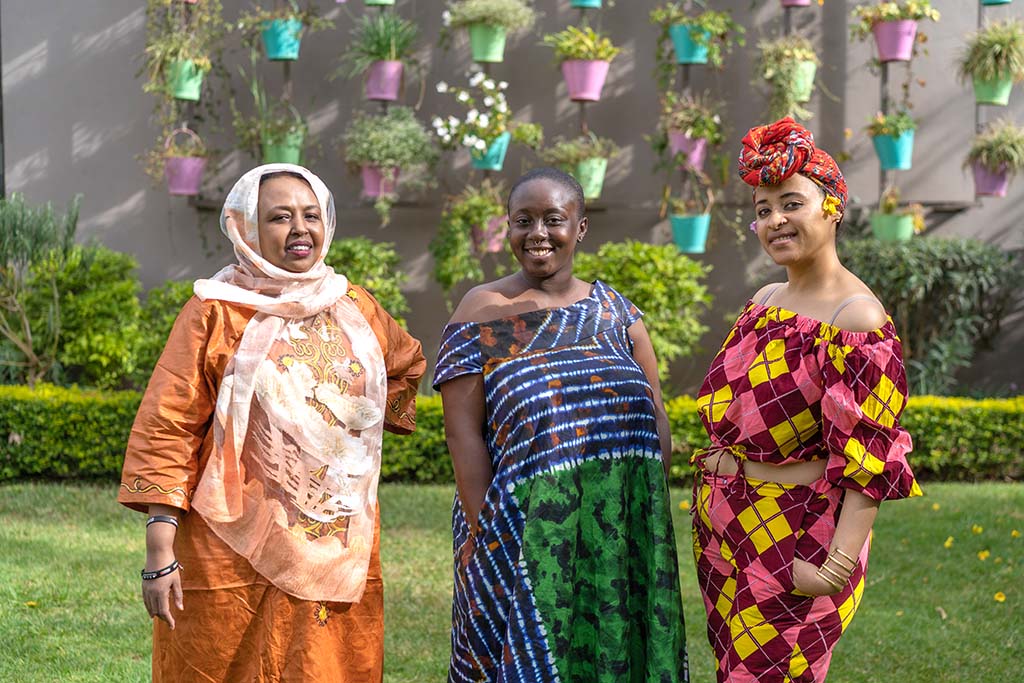Women’s rights activists networking in Nairobi
Small changes in the right direction—women human rights defenders in conflict-affected settings certainly know what it is like to be in the fight for the long run. We interviewed three activists from Somalia, the Republic of Sierra Leone and Ethiopia about their work.

Sexual violence against women and girls is on the top-list of issues, when three activists from Somalia, the Republic of Sierra Leone and Ethiopia are asked about the situation for women in their countries.
“We have quite a high rate of sexual gender-based violence; eight out of ten women and girls in Sierra Leone have been victims of female genital mutilation, however due to advocacy and mass sensitization and intervention the numbers are decreasing over the years,” says Yasmine Bilkis Ibrahim who adds that rape is also still used as a weapon, even though the country is in post-conflict.
In Ethiopia, the constant political unrest and conflict is causing women to live in “survival mode” and “hyper-alertness”, according to Zemdena Abebe:
“Women and girls’ bodies are taken as a battlefield with their rights completely erased and not considered. Women’s voices are also erased in peacebuilding conversations.”
Iman Addo, founder of several non-governmental organisations in Somalia, is especially concerned about the situation for women and girls living in rural areas:
“Due to constant conflicts, people are constantly displaced which means more women and girls are at the risk of being raped,” she says.
Iman is also concerned about women falling behind in the job market:
“Although women were the backbone of the economy and society during the war, you now find that more men are replacing them at work and in businesses. This is causing more and more women to live in poverty and have less opportunities, which exacerbates inequality.”
Supporting women human rights defenders
Women-led, locally run shelters is at the top of the wish list in addressing the problem. Yasmine points out that financial capital, as well as skills on how to design and implement programmes to run shelters and safe spaces, is needed to support the work that is already being done by women human rights defenders.
“They speak up about issues that are otherwise considered taboo or ignored by society yet affecting women and girls’ quality of life. Women human rights defenders have also established shelters where vulnerable and victim girls and women can seek refuge,” she says.
Solidarity and partnership are also needed to keep the movement going, according to Iman. Many young activists are scared to become involved because the work of women human rights defenders is unsafe.
“Women human rights defenders manage rape cases and seek support and justice—but we still have a long way to go. For example, we need safe houses and shelters for victims and emergency funds to evacuate activists and anyone else who does this kind of work. The price to pay for being an activist is still quite high with death threats and bounties against us,” says Iman.
Feminist solidarity
Working as a frontline activist in a conflict-affected setting takes its toll.
“The work that we do involves consuming or being exposed to secondary trauma. I personally had to leave the front-line activism because of burnout,” says Yasmine.
“But I know that even though the struggle might not end in my lifetime, we are making progress. Change comes gradually,” she continues.
Zemdena also manages to find hope, despite working in very difficult conditions:
“We are shifting the narrative and have gathered an understanding of the power within. Ethiopian women are the glue that holds the nation together through grass root community leadership. The change starts happening at community level.”
She sees feminist solidarity as a key motivator to keep going:
“Being in communion with likeminded individuals replenishes me. I do not underestimate my impact or role in creating change. I know that my work is rooted in love and does not just come from anger or bitterness.”
Kvinna till Kvinna supports local organisations working for women’s rights and sustainable peace in sub-Saharan Africa. We have offices in Bukavu (the Democratic Republic of the Congo), Monrovia (Liberia) and Kigali (Rwanda). Our goal is a future in which women have the same rights and opportunities as men to participate in society. We want women to be able to live a life free from sexual violence, abuse, discrimination and poverty.